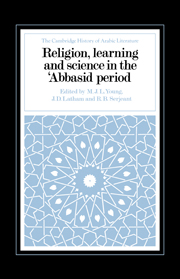Book contents
- Frontmatter
- Epigraph
- Contents
- List of plates
- Editorial preface
- List of abbreviations
- Map Literary, political and religious centres in the ʿAbbasid period
- 1 Sunnī theology
- 2 Shīʿī theological literature
- 3 Ibāḍī theological literature
- 4 Quranic exegesis
- 5 The prose literature of Ṣufism
- 6 Philosophical literature
- 7 Arabic lexicography
- 8 Arabic grammar
- 9 Islamic legal literature
- 10 Administrative literature
- 11 Arabic biographical writing
- 12 History and historians
- 13 Faṭimid history and historians
- 14 Mathematics and applied science
- 15 Astronomy
- 16 Astrology
- 17 Geographical and navigational literature
- 18 The literature of Arabic alchemy
- 19 Arabic medical literature
- 20 Al-Kindī
- 21 Al-Rāzī
- 22 Al-Fārābī
- 23 Ibn Sīnā
- 24 Al-Bīrūnī and the sciences of his time
- 25 Al-Ghazālī
- 26 Christian Arabic literature in the ʿAbbasid period
- 27 Judaeo-Arabic literature
- 28 The translation of Greek materials into Arabic
- 29 Didactic verse
- Glossary
- Bibliography
- Index
24 - Al-Bīrūnī and the sciences of his time
Published online by Cambridge University Press: 05 July 2014
- Frontmatter
- Epigraph
- Contents
- List of plates
- Editorial preface
- List of abbreviations
- Map Literary, political and religious centres in the ʿAbbasid period
- 1 Sunnī theology
- 2 Shīʿī theological literature
- 3 Ibāḍī theological literature
- 4 Quranic exegesis
- 5 The prose literature of Ṣufism
- 6 Philosophical literature
- 7 Arabic lexicography
- 8 Arabic grammar
- 9 Islamic legal literature
- 10 Administrative literature
- 11 Arabic biographical writing
- 12 History and historians
- 13 Faṭimid history and historians
- 14 Mathematics and applied science
- 15 Astronomy
- 16 Astrology
- 17 Geographical and navigational literature
- 18 The literature of Arabic alchemy
- 19 Arabic medical literature
- 20 Al-Kindī
- 21 Al-Rāzī
- 22 Al-Fārābī
- 23 Ibn Sīnā
- 24 Al-Bīrūnī and the sciences of his time
- 25 Al-Ghazālī
- 26 Christian Arabic literature in the ʿAbbasid period
- 27 Judaeo-Arabic literature
- 28 The translation of Greek materials into Arabic
- 29 Didactic verse
- Glossary
- Bibliography
- Index
Summary
BIOGRAPHICAL BACKGROUND
Abū ʾ1-Rayḥān Muḥammad b. Aḥmad al-Bīrūnī al-Khwārazmī, the most distinguished encyclopaedist of the Muslim scientists, was born in Khwārazm, apparently on the 3 Dhū ʾ1-Ḥijjah, 362/4 September 973. There is no firm etymology for his name “al-Bīrūnī”, but according to Yāqūt it is a local dialect word applied to people who lived in a suburb.
The date of al-Bīrūnī's birth is not well established. The only evidence for it is a note appended to a manuscript giving the above-mentioned date, and a statement by al-Bīrūnī himself giving his age in lunar years, which seems to corroborate that date. The usual biographical sources do not devote much space to him, and none of them give any information on his early life. All we can assert about that period is that he had studied with someone close to the Khwarazm-Shah's court, who also probably introduced him to this court. Later on he served Qābūs b. Wushmagīr (reigned 366–71/977–81 and 388–403/988–1012–13), the master of Jurjān, and to him he dedicated his first major work, al-Athār al-bāqiyah (see below), in the year 1311 of Alexander (= AD 1000). After some considerable turmoil in the political life of Khwārazm, al-Bīrūnī was apparently taken prisoner by the central Asian monarch Maḥmūd of Ghaznah (reigned 388–421/998– 1030) about the year 407/1016, and it appears that al-Bīrūnī's knowledge of astrology saved him from certain death.
- Type
- Chapter
- Information
- Religion, Learning and Science in the 'Abbasid Period , pp. 405 - 423Publisher: Cambridge University PressPrint publication year: 1990
- 1
- Cited by



